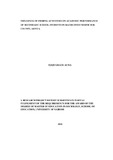| dc.contributor.author | Ojijo, Grace, A | |
| dc.date.accessioned | 2016-11-29T07:55:48Z | |
| dc.date.available | 2016-11-29T07:55:48Z | |
| dc.date.issued | 2016 | |
| dc.identifier.uri | http://hdl.handle.net/11295/97928 | |
| dc.description.abstract | The purpose of this study was to investigate the influence of fishing activities on academic performance of secondary school students in Rachuonyo North sub-county. The specific objectives were to examine the activities associated with fishing and how they influenced academic performance of secondary school students and determine the extent to which parental occupation and level of education influenced academic performance of secondary school students in Rachuonyo North Sub-County. This study was based on conflict theory advanced by Karl Max. The theory postulates that there is opposition among individual, groups and social structures. The study targeted students and principals of the 49 secondary schools in Rachuonyo North Subcounty. The researcher used simple random sampling to select 14 public secondary schools and 20 form three students in each of the sampled schools. The total sample size was 292 respondents. Information for this study was mostly generated through the use of structured questionnaires. Reliability analysis was done through doing a test-retest method to students' and principals’ questionnaire. Validity was ensured through discussion with the experts who included supervisors and colleagues. Primary data was collected and analysed using quantitative and qualitative methods and then presented in tables and graphs in percentages. Data analysis was done using the Statistical Package for Social Sciences (SPSS) and the Microsoft Excel software. The study has established that students participated in fishing activities both while attending school and after dropping out of school. Major fishing activities that students mostly engaged in included: actual fishing mentioned by 69.2% of students; repairing of fishing nets 54.6% of students; setting of nets in the lake 72.1% of students and removal of fish from the nets 72.1% of students. Further, 84.6% of the students believed that their counterparts who engage in fishing activities tend to perform poorly in their classwork. Other findings have indicated that occupation of parents is a factor that influences students’ participation in fishing activities. It is recommended that the communities along the beaches collaborate with parents, school principals and the school Boards of Management in instituting measures that will keep students from engaging in fishing activities as a strategy of improving on academic performance of students. Parents should also be encouraged to start income generating activities with the aim of improving their income status and thus reduce their children’s involvement in earning a living before completing secondary school education. | en_US |
| dc.language.iso | en | en_US |
| dc.publisher | University of Nairobi | en_US |
| dc.rights | Attribution-NonCommercial-NoDerivs 3.0 United States | * |
| dc.rights.uri | http://creativecommons.org/licenses/by-nc-nd/3.0/us/ | * |
| dc.subject | Influence of Fishing Activities on Academic Performance of Secondary School Students | en_US |
| dc.title | Influence of Fishing Activities on Academic Performance of Secondary School Students in Rachuonyo North Sub-county, Kenya. | en_US |
| dc.type | Thesis | en_US |



